Why I write
And what I can't write
Announcements about my upcoming book!!
*If you pre-order from Strand Bookstore, you get a signed copy!
Support an independent bookstore AND get a signature filled with love!
*I have two book release events coming up…
July 15: I’ll be storytelling on stage at Sixth and I in Washington DC, but the event will also be streamed virtually so you can watch from anywhere at any time. RSVP HERE!
July 18: I’ll be at Strand Bookstore in New York City. RSVP HERE!
And now…Why I write.
So I’ve been watching the Pee-wee Herman documentary.
I never watched Pee-wee’s Playhouse, nor have I seen the movie (though I reference this scene a lot in my writing workshops: Go back for the snakes!, i.e. Notice what you’re avoiding, and write that!).
But I love a good documentary and I heard this one was creatively inspiring and emotionally devastating = a favorite Mari combo.
While I was watching it, I was thinking about how deeply bizarre Pee-wee’s career was, especially his children’s show which was pure strangeness.
At a time when children’s programming started incorporating more and more moral messaging, Pee-wee just did his thing with subversive humor, sentient furniture, avant-garde puppet performances, and occasional innuendos.
And, as an adult looking back, it was really entertaining!! Certainly a LOT more thrilling than Mister Rogers’ show, which can I appreciate now but always found profoundly boring as a child.
I’ve been thinking about Pee-wee as I also consider the type of shows I want to watch with Mari Jr. in a couple years while their little brain is still Play-Doh.
My first thought was to exclusively turn on TV/movies in Spanish, then later I warmed up to the idea of shows proven to increase empathy and social skills in kids.
Entertainment plus good values education, I thought, Perfect!
But then, along came Pee-wee. And now my perspective on good children’s programming has shifted.
Allegra Frank writes, “Playhouse did not moralize or pander to children, instead focusing on how to be a decent human. The message of Pee-wee’s Playhouse was that you should embrace your deepest, weirdest, most surreal thoughts, while still treating others with respect and kindness—much as Pee-wee, for all his weird voices and spontaneous yelling, did.”
I’m now remembering how fascinated by weirdness I was as a child, and how watching really creative and oddball media gave me somewhere to belong in a world that didn’t fit quite right.
As I grew older, I found other weird kids who also liked John Waters and Miyazaki, and who would act out scenes from cult classics after watching. It wasn’t because we were smart or precocious; it was because we were lucky to have access to strangeness, which is really appealing for most children!
The genius of Pee-wee’s show is that it didn’t have a point, and certainly not a point to prove.
While you could simply summarize other kids’ TV shows (“Reading Rainbow is about…”), there was no way to articulate what the Playhouse was all about. It was a fun, exploratory dive into a mind that never stopped creating—and I think it’s great for children to see that creative work doesn’t have to know where it’s going.
Maybe because I loved deep-dives into ridiculousness in my formative years, I always saw creative work as, by definition, an exploration that doesn’t know where it’s going.
When I begin writing, I never have a point. The conclusion finds itself, and until I finish it’s a mystery movie to me, taking me on both unexpected and predictable turns until I figure out what the work wants to tell me about itself.
This is why I write.
It’s my favorite journey and most treasured adventure.
I’m not sure if it’s an effect of social media (let’s just say it’s an effect of social media) but I find that a lot of nonfiction these days has pressure on itself to have an answer ready, to come in with an end goal, to identify all the potential paths before it even gets started.
I started feeling (mostly self-imposed) pressure to create this way a few years ago, and it did damage to my fragile little creative sea anemone part of my brain that doesn’t work well when it’s being poked and prodded and squished into a specific shape.
So, I stopped doing it.
I stopped conflating creative work with persuasion, prescription, or any authority whatsoever.
My creative work is for my own exploration, and never because I already know what I want to convey (any time I slip into that territory, it’s bad writing, and I know it!).
But, social media trained us all to be an audience anticipating answers. It also trained us to easily give up our own agency to the person who’s “speaking” even if we know we disagree.
Take this post, where I touched on some thoughts I have about AI and my affection for it. I didn’t intend to make any particular statement about AI; rather, I’m curious about my own easy acceptance of it and the potential for thoughtful, sensitive people to set a soulful standard for its use.
Don’t worry ;)—plenty of folks emailed and messaged to express their concern over or ask why I didn’t mention the disastrous environmental ramifications of using AI, perhaps with an implication that it was irresponsible of me to leave that out.
I really, really get that impulse, and I share the impulse too when I read unsavory opinions from people I otherwise feel aligned with!
So here’s my answer to why I didn’t bring up the environmental destruction:
Because it’s not interesting to me.
It’s HORRIFYING, yes! But that’s as far as I get in the discussion about AI ethical tangles with the environment.
It’s horrifying, full stop.
I have nothing else to say about that.
What I find a million times more interesting—and something that individual people can actually do—is imagine how we can choose to engage with it in integrity, and how we can begin working together now to lessen environmental destruction.
Avoidance of AI from us tender earth-loving folk will only exacerbate its effects…so how do we engage instead?
I don’t have an answer to any of that, which is why it’s interesting to me!
Here’s what exploratory writing with a foundation of fact can look like, written waaaayyyy better than me by genius-brain E.L. Zeitgeist who left this monumental comment (with source citation!) on my passing thought about AI:
As for the AI bit, I’m actually with you here for the sheer fact that AI is here to stay so how do we, as artists, learn to use it as a tool not a toxin SO THAT we can help other artists understand it rather than shut down out of fear.
Because if those of us who are sensitive and leery just shut down, then the others who DO use it as a toxin will take over! (See: All of Tech progress throughout history.)
Consider gas powered cars vs electric. Back in the day, most people adopted cars over horses paying no mind to the fact that Big Oil was going to cause the worst crisis this earth has ever seen. (With that said, using horses was also a health and ecological crisis at the time.*) Meanwhile folks WERE leery of cars and their effect on the environment. IN FACT electric cars at one point were extremely popular because they were cleaner (“In 1897, the bestselling car in the US was an electric vehicle: the Pope Manufacturing Company’s Columbia Motor Carriage. Electric models were outselling steam- and petrol-powered ones.”*)
But fuel powered ICE cars became cheaper and easier to mass produce and more convenient. For those reasons (and hundreds of other political and socioeconomic reasons, like how electric cars were “women’s cars”), electric fell out of favor. We have the opportunity to learn from our mistakes again right now. Learn AI so that you can figure out ways to make it more sustainable, more equitable, more of a tool than a replacement.
Generative AI art is the lazy junk food that will ALWAYS exist in art. As any and all trends, it WILL get tired and stale (we might already be there). But using AI as a tool to improve your processes, your brainstorming sessions, your efficiency, and even your grassroots effort to make AI sustainable is a bold move that our collective future is hoping we take in stride. Technology is democratic by its very nature ONLY IF we have the courage to embrace it rather than avoid it.
Ok that’s my TED talk!! Thank you for bringing this up, Mari, because I’m all the more excited to do my own part in this early crucial chapter of our AI history!
*https://www.theguardian.com/technology/2021/aug/03/lost-history-electric-car-future-transport
I could not get over how FASCINATING her engagement with this topic was; I haven’t slept since!
Isn’t that comment a feast for thought, as opposed to a few paltry points about how much AI is wasting water (which has also been explored in much smarter detail than I could ever offer)?
In every writing workshop I teach, and in many posts here, I’ve talked about my husband’s favorite poet Mark Doty, whose philosophy has become my North Star for creative work.
After Doty’s partner died of AIDS, many of his fans asked why he wouldn’t write more political poetry, or use his poetic gifts to make statements about the government’s neglect of the most vicious pandemic.
His answer:
“Because I already know how I feel about it.”
Doty, known for being “big, risky, and fearless” in his writing, lovingly told his readers that there’s no reason for him to write about what he already thinks; his poems unearth what he doesn’t even know he thinks.
I can learn about AI’s effects on the environment from a scientific article where the brilliant writer can lay out all the information for me clearly, and I’m so glad that exists!!
But if I were to do it here, I’d feel out of my element, out of integrity for the reason I write at all, and I’d feel like I was being patronizing to you guys.
I care a LOT about trusting my readers’ inquisitiveness, curiosity, and intelligence, and that means that I would never expect you come here for your current events or science news (omg can you imagine!!).
I trust your media literacy plus your impressive collection of critical thinking skills, and that trust is a value I hold very dear as I write.
(Trying to be more Pee-wee and less Barney over here. :)
While writing my book, I kept bumping up against the suggestions of a series of “sensitivity readers,” a new-ish concept in the literary world where outside consultants are hired by a publisher to read over a book and point out perceived offensive content, stereotypes, and bias.
This is a really good idea!! The publishers are absolutely correct to bring in extra eyeballs whose job is to look out for author’s blind spots (and argue with said author about the usage of the term “blind spot” :).
Most of their advice was useful and I was appreciative of their help, but much of it threw me into a real tizzy during the final days of edits.
I understand the concerns of not wanting to offend anybody, but the problem there is that in doing so you:
a) still will inevitably offend someone (or at least not speak to their specific subjective experience, which can be a cause for offense!)
b) take readers on a distracting detour that is only there to show that the author has considered all specific subjective experience, at a great cost to the story.
Ultimately, when I explained my reasoning for not taking many of the sensitivity crew’s suggestions, it came down to the trust I have in my readers.
From an email I sent pushing back on some of the advice:
“I take my relationship with readers seriously, and part of that is my vow to not patronize them with unnecessary explanations and caveats, which they can figure out themselves through critical thinking. One of my top goals in writing this book was to make challenging topics even more messy and complex to drive home that nothing to do with humans is simple! I trust that my readers can handle a word they might disagree with, an opinion they don’t share, or a topic that doesn't cover every single one of its bases.
It's also my goal to bring in a sense of wonder and imagination to tricky human topics. If I over-explain for every person who could possibly feel excluded (which is everyone!), I lose that sense of wonder and that invitation to think critically for oneself with nuance. I end up doing a lot of thinking FOR the reader, which is the opposite of my intention.”
Okay, yes, dramatic much, but I stand by the gist!
My favorite part of writing this book was getting to exist in a state of wonder, dancing around and pushing and pulling the wonder-bubble into places where I didn’t know it could ever belong.
What a treat that was!
Adding forewarnings, amendments, elaborations, defenses, and corrections to lingo that will be out-of-date within weeks…put a yucky layer on to that treat.
Like those dessert menus that list the calories and sugar content!! Well-meaning and sometimes helpful of course, yet they interfere with the sweet magic.
A couple newsletters ago, I got another comment that knocked my socks off.
From Marike:
Someone once told me, that things and beings quickly tend to lose their magic, once you know their (scientific) name. He used birds as an example. You see a beautiful blue, black and red bird and look at it with so much curiosity and awe. Once you know it is called ,jay‘, you might find it beautiful still, but every time you see one, you immediately categorize it and stop looking.
WOW.
This idea hit my heart with a thud. I knew I’d be thinking about it for a long time and incorporate it into some writing, somewhere.
And here we are: It speaks precisely to the reason I love writing, and speaks precisely to writing’s potential pitfall.
To paraphrase the striking sentiment above:
Once you know…you stop looking.
That’s the writing journey (for me!) in a nutshell. Once I know exactly what I’m saying, or thinking, or feeling, the adventure stops. Of course, writing brings me to these conclusions and that’s satisfying/exciting.
But a journey isn’t an adventure when you already know the map and the destination at the end.
In the writing workshops I teach, I usually start with an exploration on a relatively mundane memory. I tell attendees that, counterintuitively, the most interesting stories are NOT about the most interesting thing that’s ever happened to you.
That kind of thing makes great stories to tell at a bar, but there’s not much to go on beyond, “Hey wanna hear the craziest thing I ever did??”
Rather, the weird, random, inconsequential moments in life that get stuck in our heads for whatever reason—and would make for quite boring stories to tell at the bar!—are fantastic fuel for writing.
The question, “Why do I think about that so often?” can be answered in personal essay form through a meandering exploration that usually results in some universal truth or poignant realization.
When I started writing How to be a Living Thing, three unrelated ponderings dominated my mind:
-an article about orca whales that I couldn’t stop thinking about
-a love affair with my cat—my closest friend at the time
-a bleak depression and creative block that had me desperately searching for an exit tunnel
With those three directions as I started out on my creative trek, I had no CLUE what my arrival would look like, and how long or treacherous the escapade would be.
And I loved every minute of traveling.
Over the next four years, I got to surprise myself, figure out obstacles, and stumble upon beautiful views as I skipped, tripped, and climbed over all my uncertainties and inklings to get to the book I had no intention of writing.
The idea knew where it was going; I didn’t. That was scary at times, but also brought me unparalleled elation.
When I received the physical copies of my book the other day, it gave me about five seconds of mild pleasure. “Oh cool!” was the emotional extent of my reaction.
But the years of searching, navigating, and not knowing were the real gift and joy—my greatest happiness in life, and my ultimate expression of my own aliveness on this earth.
While getting published is a dream, and external validation lifts my mood for about a minute, my true dream is the quixotic quest to figure out what wants to be created, what wants to be written, and which thoughts want to be explored.
And I say with sincerity and with excitement, I have NO idea what the next expedition will be!
Opinion pieces, analytical articles, and persuasive essays will always have an important place in our media landscape—thank god for them.
And it’s wonderful, too, that we have entertaining media for children that teaches kindness and empathy.
My hope for my child, however, is my hope for any creative person (i.e. everybody!), which is to find deep joy in being exactly who they are, and creating exactly what speaks to them.
It doesn’t always have to have a point, a message, or a moral; in fact, it’s exhilarating to begin with absolutely no meaning in mind.
The meaning will find itself, and what fun it is to get to ride along on that strange, wild, unpredictable adventure into the strange!


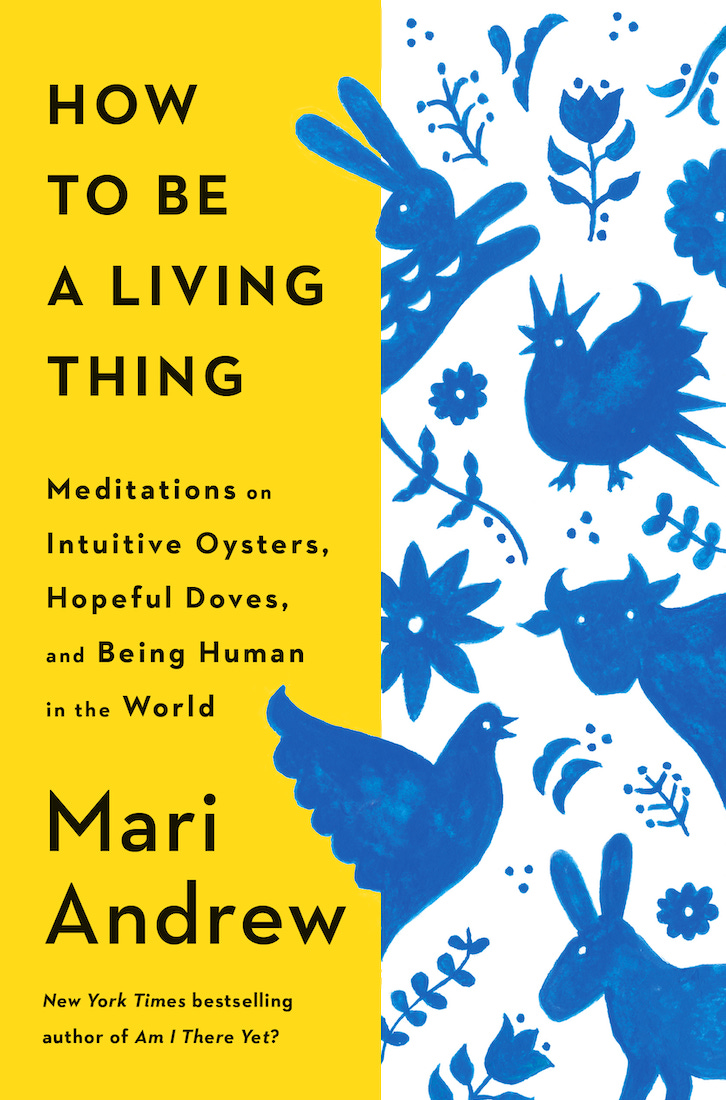
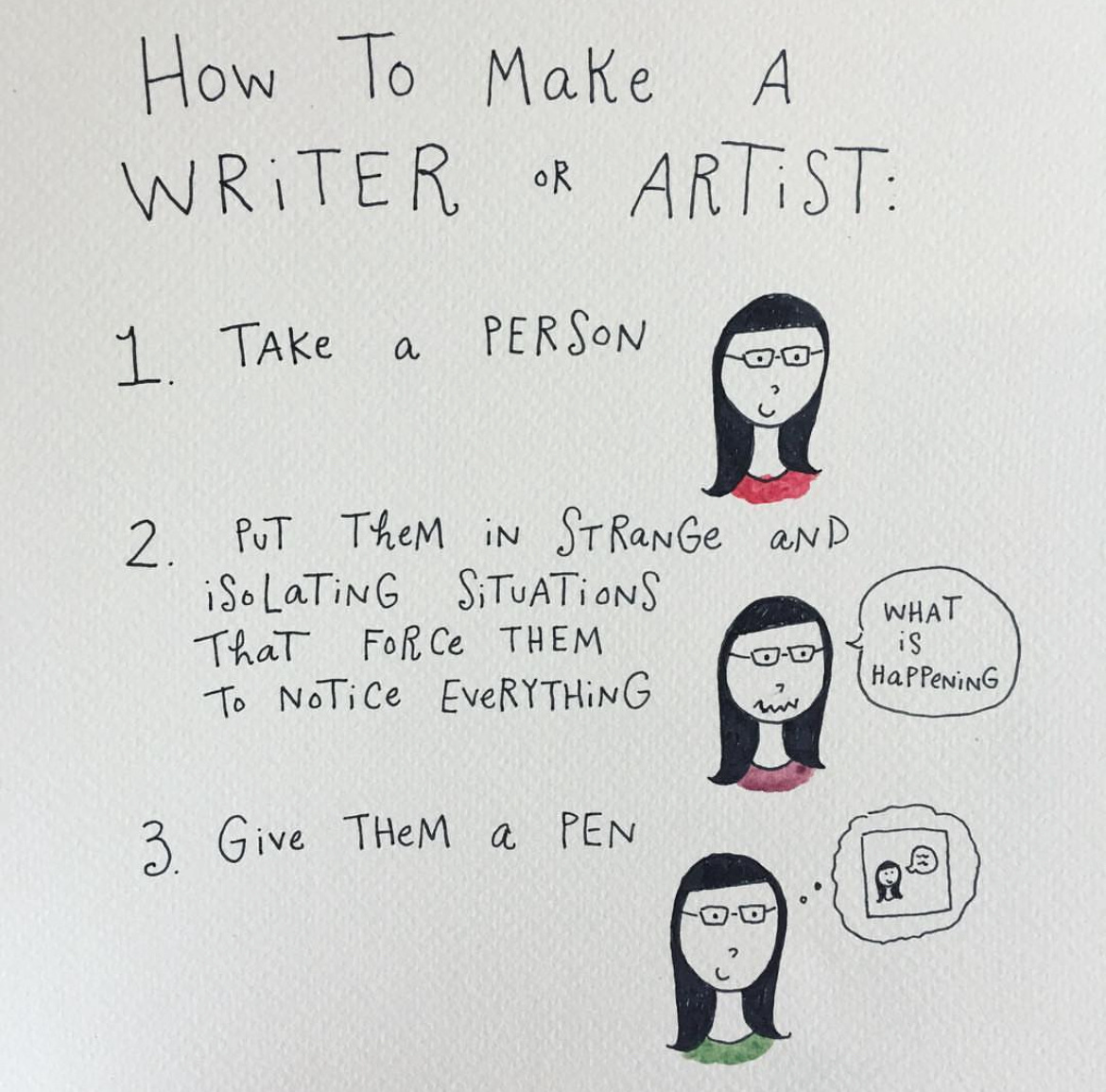
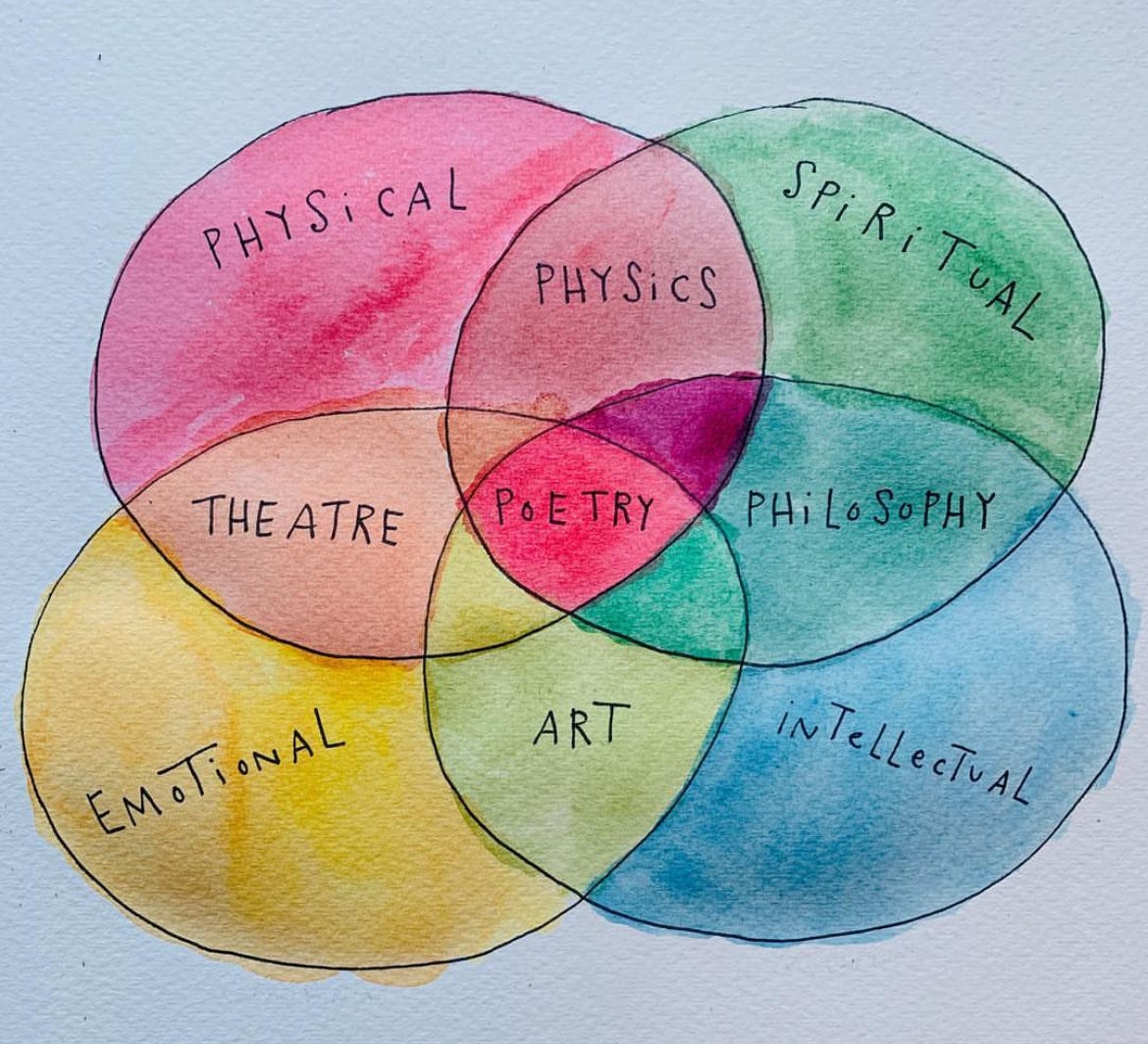

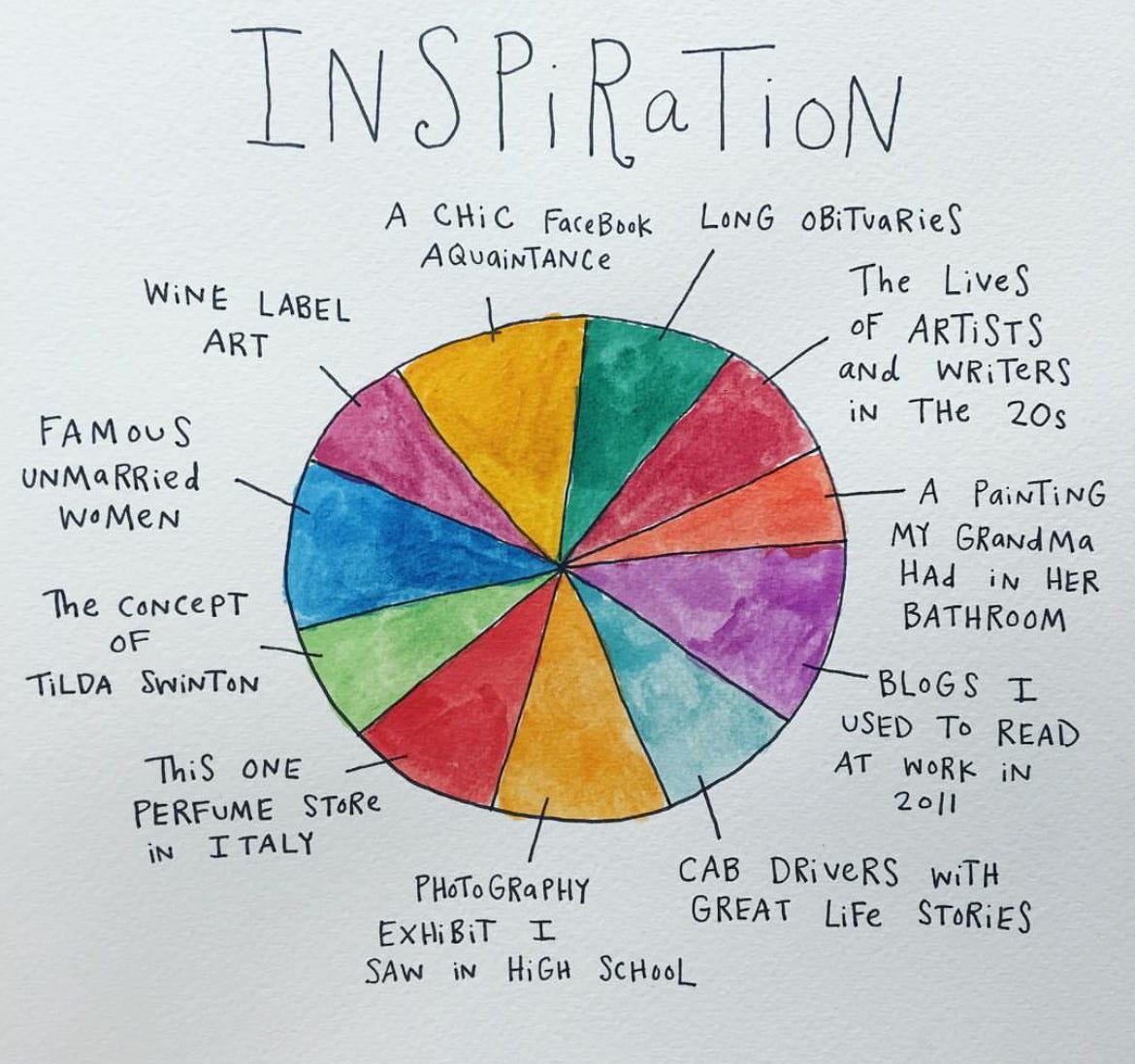
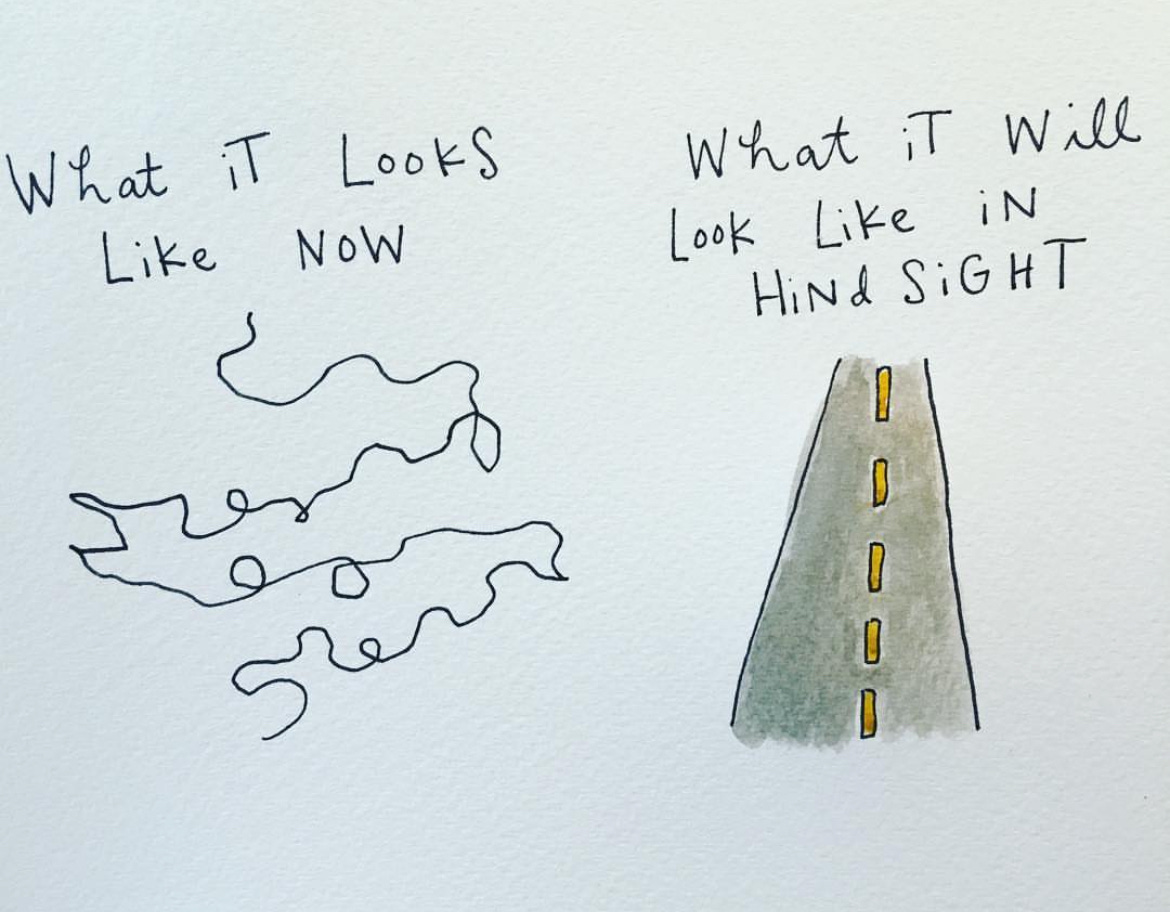
“Weird” now means strange or uncommon, but in Old English it meant “that which is destined.”
In other words, according to your essence.
The way it got to it current meaning is due to the “Three Weird Sisters” in MacBeth, who knew what was fated.
Weird: "force that sets events in motion or determines their course; what is destined to befall one;"
from Old English wyrd "fate, chance, fortune; destiny; the Fates."
In James Baldwin's Paris Review Art of Fiction interview, the interviewer asks him about the difference between being a writer and a preacher (he was a preacher in his teenage years, and his father was a preacher). Baldwin says:
"The two roles [preacher and writer] are completely unattached. When you are standing in the pulpit, you must sound as though you know what you’re talking about. When you’re writing, you’re trying to find out something which you don’t know. The whole language of writing for me is finding out what you don’t want to know, what you don’t want to find out. But something forces you to anyway."
It seems very en vogue these days to be a pseudo-preacher on social media. You must have a point. You must have a take. The take must be short. And easy to digest. And offend no one. So, you must have a depthless, meaningless take that pretends to be deep and meaningful. It's fucking exhausting and -- I think -- mind numbing, which might be the point. Thank God for writers and artists and people resisting. The world needs people who have fewer answers and more questions, and a willingness to explore. You are a gift, Mari!!!